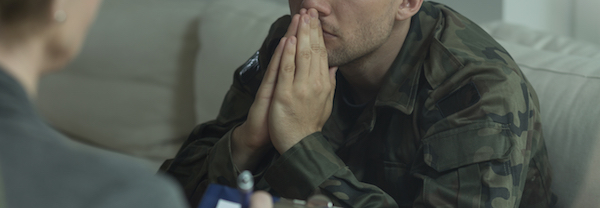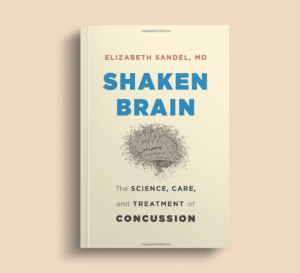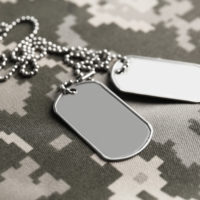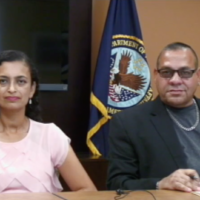Cognitive Deficits In Veterans After Brain Injury

In my interview this month, I spoke with Dr. Anthony Chen, a VA neurologist and rehabilitation neuroscientist who helps veterans with brain injuries rehabilitate. He works at the Center for Integrated Brain Health and Wellness in Martinez, CA and is on the faculty of the Veterans Affairs Northern California Health Care System and UCSF.
With Dr. Chen’s focus on cognitive rehabilitation, I thought it would be good to first look in a little more detail at exactly what cognitive deficits he’s typically seeing and treating.
Typical Cognitive Deficits Resulting From Brain Injuries
When the brain is physically injured, whether in an accident, assault, or (in the case of military personnel in combat zones) explosion or other military-related activity, it can and often does lead to short- or long-term problems with cognition. Cognition refers to how the brain records, retrieves, and processes information, and problems with cognition can manifest in many ways and impact life at school, at work, and at home.
It’s easy to think about these things on an academic level and in academic terms, but the very real consequences can greatly affect someone on a day-to-day level and as they pursue long-term life goals.
Setting and achieving life goals
This is an issue of executive function, which is an overarching term used to describe how a person organizes activities and plans ahead for the future. With a brain injury, setting goals, understanding how to achieve them, and then following through can all be affected if executive functions have been impaired.
Solving problems
Another executive function, problem-solving skills, can be impaired after brain injury. Problem solving is one of the most essential skills any adult can have, and an impairment here doesn’t just affect success with literal problem solving, for example on a school assignment, but problem solving anywhere that requires the ability to bring disparate ideas or plans together and come up with innovative solutions.
Paying attention
Being able to focus when necessary on what a professor, boss, or spouse is saying is important to maintaining good relationships and being successful in school, work, and marriage. Many people have problems paying attention and sustaining focus after a brain injury. They can be easily distracted, especially in environments with a lot going on. Impaired attention can make it very difficult or impossible to get schoolwork or work projects done in a timely and efficient manner. Many activities require alternating attention, that is focusing on one thing and then another. This can happen for example in social situations when the conversation keeps shifting.
Remembering things
There are many aspects of memory and some aspects may be affected by brain injuries while others are fine. For example, one person may study for hours and simply not be able to “lay down” the memories of what they’ve studied to form long-term memories. Another person may have trouble with working memory after a brain injury, meaning they have a hard time “holding things in mind” as they work through a problem or attend to multiple things at once.
Understanding and producing language
Language is an enormous aspect of how we not only communicate with each other, but how we process our own thoughts internally. Difficulties with language can affect the ability to understand and/or produce appropriate words or sequences of words, and can be with written and/or spoken language. People with language deficits after brain injury may report having a hard time finding the word they’re looking for, taking longer to understand what someone is saying, especially if they are talking quickly, and needing to read things over and over just to take the information in.
Overcoming Cognitive Impairments
For many people who have sustained a brain injury, cognitive symptoms may be short-lived and disappear after a few weeks or months. For others, they will experience them and the consequences to success in home, school, and work on a long-term basis. Fortunately, professionals like Dr. Chen have solutions and work with them to address these impairments through cognitive rehabilitation, which is the topic for the next blog.
You Might Also Like
Modeling Brain Injury Care in the VA System
Dr. Anthony Chen is a neurologist specializing in the evaluation and treatment of veterans with traumatic brain injuries. Dr. Chen discusses the treatment of cognitive disorders that occur after these injuries, and the common co-occurrence of post-traumatic stress disorder and other mental health conditions in people with a history of…
A Veteran Talks About his Brain Injuries and Care at the VA
A veteran talks about his experiences with several concussions, and his successful treatment with cognitive and group therapies at the Veterans Administration program in Martinez, California.
Causes of Brain Injury in Military and Veterans
Interview with physiatrist Dr. Hetal Lakhani and 38-year Army veteran, Richard Reyes, who sustained three brain injuries during his military career.
Keep up to date
Get updates on the latest in concussion, brain health, and science-related tools from Dr. Elizabeth Sandel, M.D.
By clicking SIGN UP, you agree to receive emails from Dr. Sandel and agree to our terms of use and privacy policy.
Get the book!




